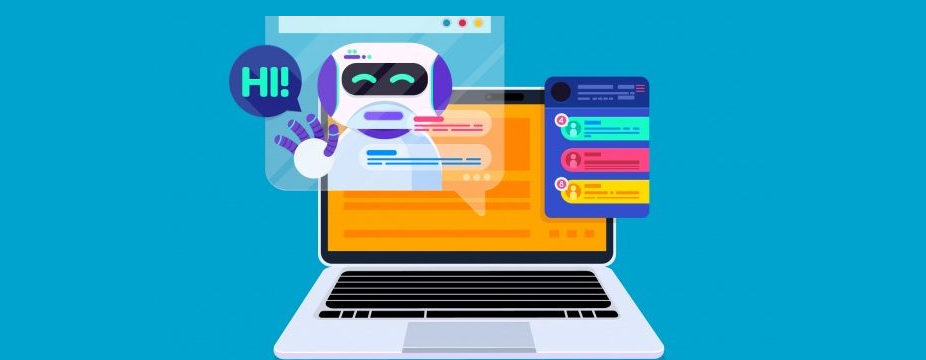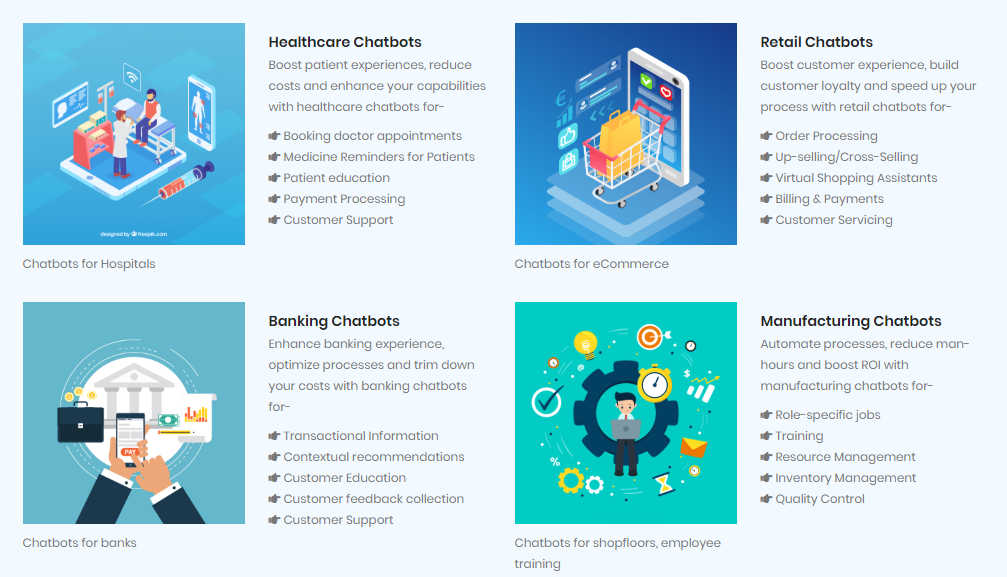|
Getting your Trinity Audio player ready...
|
Enterprise Chatbots or Virtual Assistants are computer programs that mimic human conversations with real people by using Artificial Intelligence(AI) and Natural Language Processing(NLP). Enterprises are spending more on Chatbot Development as they increase productivity, save time, improve customer engagement and enhance the customer service experience thereby improving ROI. According to a report by Gartner, 50% of enterprises will be spending more on chatbots than on mobile apps by 2024.
Evolution of Chatbots – A brief history
Chatbots are not new as they have been around for more than fifty years now. The first ever chatbot, named Eliza, was programmed at MIT in 1966. Eliza simulated a psychotherapist and used a script to answer the typed questions of patients by using simple pattern matching. Over the years, enterprises came up with new and modified versions of the then-existing chatbots like Parry (a modified version of Eliza, in 1972), Dr. Sbaitso (imitated the responses of a psychologist in a human voice, in 1992), Alice (most famous Chatbot of the 20th century, in 1995). With the evolution of systems from mechanical computation to intelligent systems, Chatbots now are able to imitate human intelligence and mimic human conversation. According to a Gartner report, 85% of customer interactions will be carried out without human agents by 2020.
What is an Enterprise Chatbot?
An Enterprise Chatbot is a chatbot powered by Natural Language Processing, that brings deeper natural language understanding and provides interaction between the corporate data, employees, and customers. Enterprise Chatbots help deliver seamless and omnichannel experiences by improving speed, efficiency, and productivity.
Attributes for a Chatbot
Enterprise chatbot solutions make it easier to integrate a chatbot into internal and external business processes. The following are a few characteristics that should be taken into account while building chatbots-
–A chatbot that sounds and mimics human-like conversations will get more users engaged in business operations.
–A chatbot should be able to understand the intent behind the customers’ requests. The ability to guess and provide solutions in time will enhance customer service.
–Enterprise chatbots should be equipped with sufficient dialogue capabilities and should be able to connect to the back-end systems to perform tasks for users.
–Chatbot platforms should be able to report and track the chatbot’s performance.
–Chatbots should be enabled to have complex and meaningful conversations with users.
Chatbots for enterprises
Enterprises with large volumes of millennials are relying more on chatbots as they are able to map spoken or written input to intent by using Natural Language Processing. Chatbots are becoming an integral part of many companies’ business operations.
Providing customer support – With advancements in AI and NLP, Enterprise Chatbots are capable to provide round-the-clock customer support without any extra costs incurred, while human supervision is always recommended to avoid unpleasant and dissatisfactory customer service.
As personal assistants – For an enterprise providing a personal assistant for each employee is, financially, not a feasible option. Chatbots can serve as personal assistants, handling calendars, schedules, managing expenses, etc.
Collaborating with internal teams/departments – Collaborating with other departments is a time-consuming process. Employees often find it difficult to attend to the many queries raised by their co-workers from different departments because of the time constraint. This task is made simpler by chatbots as they can get access to the internal files and provide related information when a question is asked, without disturbing the concerned department personnel.
Automation and streamlining of business processes – Chatbots are capable of performing multiple tasks simultaneously without errors. This allows for the automation of various internal and external business processes. With the help of chatbots, business processes can be streamlined to a great extent as chatbots can perform many repetitive yet essential tasks relieving the employees so that they can concentrate on other important revenue-generating tasks.
Providing in-depth product knowledge within the enterprise as well as to the customers – Any enterprise often offers a huge variety of products and services. Chatbots provide their customers with the most desired and accurate answers by providing them with information regarding the products and services offered by the company and improve customer engagement by seamlessly pushing them through the sales funnel. Similarly, Chatbots also help in reducing operational costs by providing online training to new employees allowing a smooth transition to the new working environment.
Popular Enterprise Chatbots
While there are numerous varieties of enterprise chatbot platforms, few of them stood out because of the services and level of ease they offer to their customers.
IBM Watson Assistant – IBM’s own Chatbot, Watson Assistant, is one of the most advanced AI-powered chatbots. It is more than just a chatbot as it can understand when to search for an answer from the knowledge base, and when to direct to human representatives.
Amazon’s Alexa – Alexa is a cloud-based voice service that can build natural voice experiences that provide customers with a more intuitive way to interact with the technology. The new self-teaching Alexa AI is three percent more accurate in determining the emotions being expressed in a sentence.
Apple’s Siri – Siri is an AI-powered virtual assistant, from Apple Inc, that uses voice queries to answer, performs actions, and make recommendations based on users’ requirements on the IOS devices.
Enterprise Chatbots hugely rely on technologies like Machine Learning, Deep Learning, and NLP and provide intelligent solutions based on previous interactions. With the growing sophistication and accuracy of AI, Chatbots have become more robust and suitable for a broader range of applications.
If you need any help with idea validation, proof-of-concept, Data Science consulting, large-scale AI implementation, Big Data Engineering, or a creative solution for your Business Operations data. You are at the right place.
Talk to our experts


